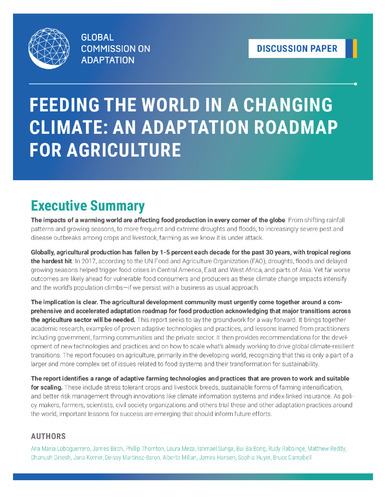Feeding the World in a Changing Climate: An Adaptation Roadmap for Agriculture
Abstract
The impacts of a warming world are affecting food production in every corner of the globe. From shifting rainfall patterns and growing seasons, to more frequent and extreme droughts and floods, to increasingly severe pest and disease outbreaks among crops and livestock, farming as we know it is under attack.
Globally, agricultural production has fallen by 1-5 percent each decade for the past 30 years, with tropical regions the hardest hit. In 2017, according to the UN Food and Agriculture Organization (FAO), droughts, floods and delayed growing seasons helped trigger food crises in Central America, East and West Africa, and parts of Asia. Yet far worse outcomes are likely ahead for vulnerable food consumers and producers as these climate change impacts intensify and the world’s population climbs—if we persist with a business as usual approach.
The implication is clear. The agricultural development community must urgently come together around a comprehensive and accelerated adaptation roadmap for food production acknowledging that major transitions across the agriculture sector will be needed. This report seeks to lay the groundwork for a way forward. It brings together academic research, examples of proven adaptive technologies and practices, and lessons learned from practitioners including government, farming communities and the private sector. It then provides recommendations for the development of new technologies and practices and on how to scale what’s already working to drive global climate-resilient transitions. The report focuses on agriculture, primarily in the developing world, recognizing that this is only a part of a larger and more complex set of issues related to food systems and their transformation for sustainability.
The report identifies a range of adaptive farming technologies and practices that are proven to work and suitable for scaling. These include stress tolerant crops and livestock breeds, sustainable forms of farming intensification, and better risk management through innovations like climate information systems and index-linked insurance. As policy makers, farmers, scientists, civil society organizations and others trial these and other adaptation practices around the world, important lessons for success are emerging that should inform future efforts.

